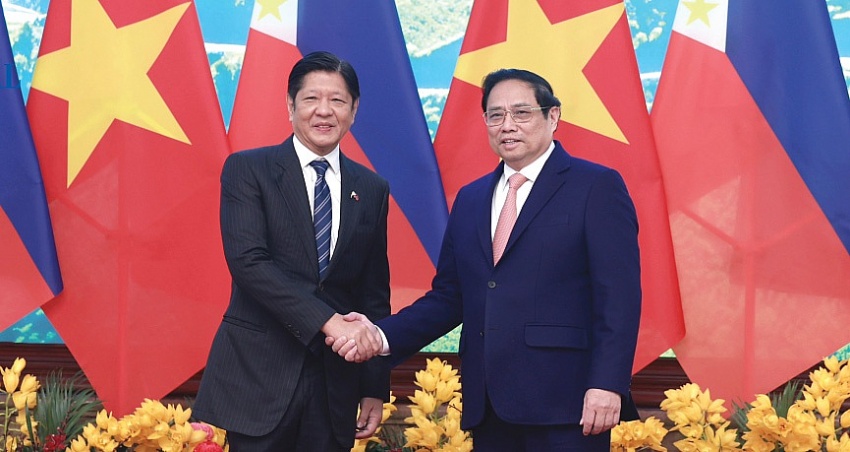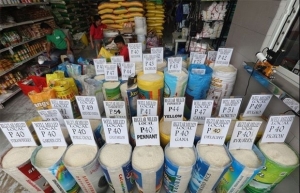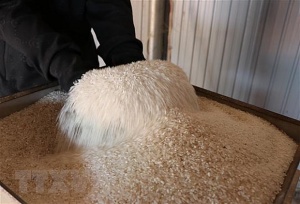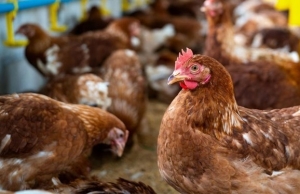Food security tops agenda in new ties with Philippines
 |
| President of the Philippines, Ferdinand Romualdez Marcos, with Vietnam PM Pham Minh Chinh in Hanoi last week |
During the state visit to Vietnam by the Philippines’ President Ferdinand Romualdez Marcos last week, the two Southeast Asian nations agreed that they will devise new mechanisms to enhance regional economic connectivity such as ASEAN’s Free Trade Agreement, Trade in Goods Agreement, and Comprehensive Investment Agreement.
The two countries have also pledged to facilitate investments of each other into respective markets, especially projects involving processing, infrastructure, the vehicle supporting industry, renewable energy, and high-tech agriculture.
According to an investment report released in late December by the ASEAN Secretariat and the UN Conference on Trade and Development, from 2013 to 2022, more than one-third of the favourable foreign direct investment (FDI) measures in ASEAN related to opening new sectors or activities.
For example, in 2021–2022, Vietnam allowed complete FDI in insurance and set implementation guidelines for the 2020 Law on Investment, which includes a restrictive list for market access for foreign investors. Similarly, the Philippines permitted full FDI in renewables and revised its negative list by removing manufacture, repair, storage and distribution of products requiring clearance from its defence department.
Foreign ownership restrictions in small- and medium-sized enterprises and trading enterprises were also relaxed. Besides this, wholly foreign ownership of public services, such as telecommunication, airlines, shipping and railways was allowed.
Figures from the Vietnamese Ministry of Planning and Investment showed that currently the Philippines has 95 valid ventures in Vietnam registered at $608.2 million, ranking 31st out of 144 nations and territories with projects in Vietnam.
Last year, leaders of Philippine group Vista Land visited the Mekong Delta city of Can Tho searching for investment and trade opportunities. Currently, Vista Land is looking for Vietnamese partners to supply assorted products to distribute to its retail chains. The products include enamelled tiles, cement, furniture, rice, agricultural products, snacks, fruit juice, and coffee.
URC Vietnam, part of Universal Robina Corporation and belonging to JG Summit Philippines, also considers Vietnam a lucrative market.
In Vietnam, URC started operations in 2003 as a trading company specialising in imported products until its first factory with snack and candy lines was built at Vietnam-Singapore Industrial Park in the southern province of Binh Duong. URC’s factories have been replicated throughout the country, including three in Binh Duong, one in the south-central province of Quang Ngai, and one in Hanoi.
Meanwhile, Vietnam currently has five projects in the Philippines, registered at nearly $4 million.
In addition to investment, Vietnam and the Philippines have also agreed to promote economic and trade relations, with a major focus laid on the rice trade. They will consider removing unnecessary barriers and support each other to ensure food security, while creating a favourable business and investment climate.
Both nations last week also inked an MoU on rice trading cooperation, aimed to help ensure economic benefit and food security. The Philippines is now the largest rice export market of Vietnam, with a volume of 2.63 million tonnes in the first 11 months of last year, valued at $1.41 billion.
The two countries last week also set a target of reaching a bilateral trade turnover of $10 billion next year, and promoted cooperation in other potential fields such as digital economy, circular economy, green economy, renewable energy, combating climate change, and supporting each other in developing the marine economy, innovation, and startups.
Bilateral trade turnover between the pair increased from $2.9 billion in 2012 to $7.8 billion in 2022. In the first 11 months of 2023, the figure hit $7.1 billion.
The Philippines is the 16th largest trade partner of Vietnam worldwide and the sixth-largest trade partner of Vietnam in Southeast Asia. At present, there are about 30,000 Vietnamese nationals living and working in the Philippines, where there are also 700 Vietnamese students.
Vietnam and the Philippines forged their diplomatic relations in 1976, which were elevated to a strategic partnership in 2015. In 2019, they signed an action programme on implementing the strategic partnership for the following five years.
| Sectors of cooperation between Vietnam and the Philippines Regarding defence and security, the two sides have been actively implementing signed agreements to expand cooperation in defence, logistics, military medicine, search and rescue, humanitarian assistance and natural disaster relief, transnational crime prevention, and anti-terrorism. At the same time, the two countries are also speeding up negotiations and the signing of an MoU on bilateral logistics support, and of agreements on extradition and transfer of sentenced individuals. When it comes to sea and ocean cooperation, Vietnam and the Philippines established a joint working group on seas and oceans, which met regularly every year and then was upgraded to the Joint Commission on Maritime and Ocean Cooperation in 2012. As for maritime cooperation, the two sides are promoting negotiations on a commercial transport agreement to replace the Vietnam-Philippines Maritime Transport Agreement signed in 1992, while also actively implementing a bilateral agreement on search and rescue at sea inked in 2010 and taking effect in 2012. In addition to the MoU on academic cooperation was clinched in 2010, and the two countries are also working on an educational cooperation deal. There are currently nearly 40 Filipino students studying at Vietnam’s Thai Nguyen University. Regarding culture and tourism cooperation, the two sides are negotiating the Cultural Cooperation Programme for 2024-2028 and discussing the initiative on Implementation of the Cooperation Agreement on Tourism between the Department of Tourism of the Philippines and the Ministry of Culture, Sports, and Tourism of Vietnam for 2024-2028. In 2022, Vietnam welcomed about 49,300 Filipino visitor arrivals, while the Philippines was visited by more than 25,900 Vietnamese tourists. In the first nine months of 2023, the number of Filipino visitor arrivals to Vietnam reached 130,000, and the Philippines welcomed nearly 52,000 visitors from Vietnam, equivalent to the same period in 2019. When it comes to labour cooperation, the two countries planned to coordinate to soon sign a labour cooperation agreement. However, the two sides’ labour management agencies have yet to negotiate and ink this agreement. Regarding cooperation in agriculture, fisheries, and aquaculture, from 1964 to 2009, the International Rice Research Institute in the Philippines trained 254 scientists for Vietnam, including 55 masters and 29 doctors. In 2010, the two sides signed an agreement on fisheries cooperation, laying the groundwork for specific cooperation projects on fisheries and the establishment of a fisheries cooperation committee. At present, Vietnam and the Philippines are considering the establishment of an intergovernmental agreement on rice cooperation with a term of five years to support each other in ensuring food security. At the recent Joint Committee on Bilateral Cooperation meeting in August 2023, the two sides agreed to deploy a new agreement on setting up a hotline to handle illegal fishing issues and support fishermen. Source: Vietnam’s Ministry of Foreign Affairs |
 | Philippines sets ceiling on rice prices The Philippines has imposed ceilings on rice prices across the country amid an “alarming” increase in retail costs of the staple grain and reports of hoarding by traders. |
 | Philippines seeks measures for cutting rice prices The Philippines is considering options other than a price ceiling to tackle high rice prices, the country’s National Economic and Development Authority (NEDA) has said. |
 | Philippines bans poultry imports from Japan The Philippines has imposed a temporary ban on the importation of poultry and poultry products from Japan due to an outbreak of bird flu there, the Philippine Department of Agriculture said on January 18. |
What the stars mean:
★ Poor ★ ★ Promising ★★★ Good ★★★★ Very good ★★★★★ Exceptional
Related Contents
Latest News
More News
- Site clearance work launched for Dung Quat refinery upgrade (February 04, 2026 | 18:06)
- Masan High-Tech Materials reports profit: a view from Nui Phao mine (February 04, 2026 | 16:13)
- Hermes joins Long Thanh cargo terminal development (February 04, 2026 | 15:59)
- SCG enhances production and distribution in Vietnam (February 04, 2026 | 08:00)
- UNIVACCO strengthens Asia expansion with Vietnam facility (February 03, 2026 | 08:00)
- Cai Mep Ha Port project wins approval with $1.95bn investment (February 02, 2026 | 16:17)
- Repositioning Vietnam in Asia’s manufacturing race (February 02, 2026 | 16:00)
- Manufacturing growth remains solid in early 2026 (February 02, 2026 | 15:28)
- Navigating venture capital trends across the continent (February 02, 2026 | 14:00)
- Motivations to achieve high growth (February 02, 2026 | 11:00)

 Tag:
Tag:



















 Mobile Version
Mobile Version